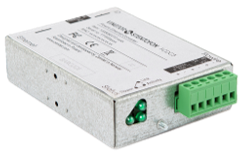Difference between revisions of "FCDC3"
Jump to navigation
Jump to search
(→Highlights) |
|||
| Line 12: | Line 12: | ||
== Highlights == | == Highlights == | ||
| − | *[[ | + | *[[FCDC3#PoE-power_forwarding|PoE-power forwarding]] enable/disable by switch |
*Separate Power input – isolated from the PLC bus | *Separate Power input – isolated from the PLC bus | ||
*Several Flowire Clusters can be powered from same power supply | *Several Flowire Clusters can be powered from same power supply | ||
*[[FCDC-3 - Backwards compatibility|Backwards compatible]] with FCDC1/2/TFIX after software upgrade | *[[FCDC-3 - Backwards compatibility|Backwards compatible]] with FCDC1/2/TFIX after software upgrade | ||
*Replacement for [[FCDC-1]] and [[FCDC-2]] | *Replacement for [[FCDC-1]] and [[FCDC-2]] | ||
| − | |||
== Installation == | == Installation == | ||
Revision as of 10:55, 3 February 2020
Flowire Ethernet Converter
- One single-paired cable can be used to distribute power and data
- The cable hauls can be longer than standard ethernet cabling, reducing the need for switches and/or repeaters
- Up to 10 Flowire devices can be connected to the same 2-wire network structure
- Existing infrastructure can be used, even though only a single pair is available, which reduces the total cost of retrofit projects
- The Flowire Converter can be used with any Ethernet enabled device
The Flowire Converter enables Ethernet to run on the same two wires as power, providing simpler cabling and opens up for longer cable hauls. The Flowire Converter is also capable of powering Ethernet devices attached to it, such as IP intercom stations or IP cameras.
Highlights
- PoE-power forwarding enable/disable by switch
- Separate Power input – isolated from the PLC bus
- Several Flowire Clusters can be powered from same power supply
- Backwards compatible with FCDC1/2/TFIX after software upgrade
- Replacement for FCDC-1 and FCDC-2
Installation
Overview
Placement
Mounting
PoE-power forwarding
The FCDC-3 unit can forward the power received on the PLC line out to the spare pairs of the Ethernet port (PoE, mode B). The "PoE-power forwarding" is enabled or disabled by the switch located next to the ethernet port.
